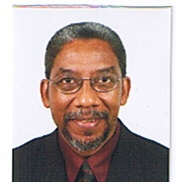 A curious article appeared in a daily newspaper 2 days ago. Headlined “They’re operating with secrecy” with a sub-head “Moonilal questions why there are 2 CoPs”. You can check the article at this link - https://www.trinidadexpress.com/news/local/they-re-operating-with-secrecy/article_959f2c36-9ab6-11e8-b131-43c4bc155528.html. It seems that this is part of a series that may be titled – The Saga of a CoP’s appointment. The questions posed in the article are even more intriguing given the person raising them. Dr. Roodal Moonilal is not just a politician. He also has a more than casual knowledge of Industrial Relations and Human Resource Management and Government. However, the content of this article suggests that, perhaps temporarily, he discarded his academic credentials. “Why are there two police commissioners in the country?”, he asks. THE ANSWER IS IN THE 2006 ‘POLICE REFORM’ LEGISLATION In fact, he spoke quite authoritatively (in the House debate on the Dulalchan nomination) giving all kinds of explanation about the intentions of the politicians when they amended the Constitution and Police Service Act in 2006. The passage of those bits of legislation is what created the Recruitment Process for CoP and DCoP which the PM described on February 2, as “unacceptable”” cumbersome” “expensive” and “I recommended that we do away with it”. Yes, the very ‘flawed’ process. Those changes not only set up that recruitment process, it also converted the position of Police Commissioner into 2-headed monstrosity in terms of public service law and practice. The same applies to Deputy Commissioner. The post of Police Commissioner is at the same time, both a Public Service Post and a Contract Position, depending on whether the person appointed is promoted through the ranks (like Williams) or is appointed from ‘outside’ (like Ewatsky and now Griffith). This is the source of Dr. Moonilal’s confusion. And, he should know since he was one of the Parliamentarians who unanimously changed the law to create this dual creature. The PM, Opposition Leader and several currently in the House were also there in 2006. Service Commissions Can Only Appoint Public Officers to Public Offices Contrary to all norms in the Public Service, the Police Service Commission which has jurisdiction to appoint, promote, discipline, dismiss, monitor the discharge of the functions of the Commissioner of Police (s.123 of the Constitution). However, unlike any other Service Commission, the Police Service Commission must follow a process determined by, then submit the name of the person selected for appointment, to Lower House of Parliament. This Commission can make an appointment ‘only after the House of Representatives approves” (s. 123(5)) Service Commissions are legally empowered to make appointments to Public Offices in a Public Service. No other organ or body of the state can appoint a Public Officer. In recent years, when the Financial Intelligence Unit (FIU) was created, Cabinet, thinking that the post of Head of the FIU was not a Public Office, proceeded to appoint Mr. David West to that position. Subsequently, the Court ruled that the Head of the FIU was indeed a Public Office and only the Public Service Commission could appoint an Officer to that position. The post was advertised, and the current holder was appointed. A similar situation occurred in the 1990’s when the current Finance Minister ‘installed’ a Transport Commissioner appointed by Cabinet into that Office. The Court also ruled that appointment illegal. However, the recruitment process created in 2006, has created a completely incongruous situation, by making it possible for the Police Service Commission to ‘appoint’ non-Public Officers to be appointed to a Contract Post of Police Commissioner. Because of this irregular (possibly illegal) situation, the Police Service Commission issued a “letter of appointment” to Gary Griffith as Commissioner of Police on Contract, the terms of which are to be settled by the National Security Ministry and Cabinet. At the same time, Mr. Williams, is Acting Commissioner in a Public Office the terms of which are determined by the Salaries Review Commission. This is what Dr. Moonilal is describing as ‘surreptitious” operation by the Police Service Commission. Today, the National Security cum Communication Minister, declared this is “all normal”, in obvious response to Moonilal’s “questions”. A sad display of political sparring. This is the confusion which Dr. Moonilal and every other Parliamentarian created when they all voted for the ‘police reform’ legislation in 2006. The Police Service Commission is Following the Law Just as the PM argued in the case of the 3rd and 4th nomination notice debates, that by going down the Order of Merit List of nominees for Commissioner, the House was ‘just following the law’, the very law they created in 2006. So, too, in issuing an ‘appointment letter’ to a Contract Position of Police Commissioner, while having an Acing Commissioner in a Public Service Office to which they had appointed him to act over 6 years, the Police Service Commissioner is ‘just following the law’. The PM changed his tune from his February 2 recommendation to ‘do away with’ the process to a ‘let’s follow the law’ position. Dr. Moonilal who was most articulate in trying to justify the same process on February 2, now claims to be perplexed at the righteous mess it has created. The politicians, who were all singular in their eagerness in 2006 to have veto control over the appointment of the CoP and DCoP, even gave themselves veto power over the President’s appointees to the Police Service Commission (s. 122(5)) since the President can appoint Commission members “only after the House of Representatives has approved…”. Now, having the power to approve who is on the Commission, how the Commission is to conduct recruitment and with power to approve both CoP and DCoP and having created a completely unheard of dual Public Office – Contract Position in those positions, the politicians, seek to blame the Police Service Commission for the total ball of confusion that they created themselves in 2006. Having compromised the Commission and its independence and decision-making, the politicians now seek to excoriate it and its members and hold themselves blameless. This is what happens when the Political Directorate seeks to usurp all power to itself and exercise a Power-to-Deny rather than a Power-to-Share decision-making. Clyde A Weatherhead A Citizen Fighting For Democratic Renewal of Our Society 09 August 2018 Comments are closed.
|
AuthorI am a appalled at the loss of the simple skills of discussing ideas and sharing Opinions to DEEPEN ANALYSIS and UNDERSTAND DEVELOPMENTS to ARRIVE AT SOLUTIONS. Archives
April 2024
Categories |

About Clyde Weatherhead
Clyde has been involved in public life as a political activist, a trade unionist, Lawyer, Teacher and Author |
Connect With Clyde
Write to Clyde on Facebook Visit Clyde's Author Page on Amazon Go To Discussion on Facebook For Employment Relations Issues |

 RSS Feed
RSS Feed